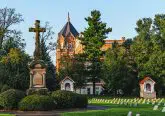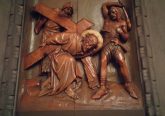Michigan township can’t ban Catholic group’s Stations of the Cross, court rules
Denver, Colo., Sep 12, 2023 / 15:45 pm
A federal appeals court panel has unanimously ruled in favor of a Catholic group that said a local government in Michigan violated federal religious freedom law when it blocked the use of the group’s 40-acre property for a Stations of the Cross trail.
“Now this 40-acre rural property can be used again for religious worship and religious expression. We’re obviously very pleased by that,” Robert Muise, senior counsel and co-founder of the American Freedom Law Center, told CNA Sept. 12.
“When you’re not being allowed to use your land for religious worship to display religious symbols, that obviously impacts the right to religious freedom,” he said.
Muise was on the legal team representing the plaintiff in the case, Catholic Healthcare International (CHI). The Missouri-based group promotes Christian health care modeled on the example of the 20th-century Italian St. Pio of Pietrelcina, better know as Padre Pio.
In 2020 the organization received a 40-acre wooded parcel in Genoa Township in southeast Michigan as a gift from the Diocese of Lansing. CHI planned to create a prayer trail with Stations of the Cross, a Catholic devotion that meditates on the crucifixion of Jesus Christ, as well as an altar and mural placed in an outdoor grotto formed by the property’s trees.
Genoa Township said the prayer path project was the equivalent of a church building and required a special use permit, the Associated Press reported. The Catholic group protested the initial demand for a permit and proceeded to construct religious displays. It also spent thousands of dollars to submit plans for an actual church building, a eucharistic adoration chapel already part of its long-term plans for the site. This too was rejected on grounds that the plan violated zoning restrictions and other rules for property use, including traffic and noise rules.
The township then forced CHI to remove any religious displays from its property. It also banned organized gatherings at the property due to an expired driveway permit.
A three-judge panel of the U.S. Court of Appeals for the Sixth Circuit on Monday sided with CHI and granted an injunction barring Genoa Township from obstructing CHI’s religious displays.
U.S. Circuit Judge Raymond Kethledge, writing the panel decision, ruled that the township’s use of zoning laws imposed a “substantial burden” on the Catholic group’s religious freedom and likely violated the federal Religious Land Use and Institutionalized Persons Act, which provides strong religious exercise protections for land.
“Catholic Healthcare’s expectation that it could use the property for a prayer campus at the time it acquired the property was not unreasonable,” Kethledge’s decision said.
CHI’s first permit application cost over $30,000 to submit and its second application cost $8,000, but both applications were rejected.
In its ruling, the appellate panel ordered a lower court to ensure that banned symbols and displays can be restored before Sept. 23, when CHI plans to host an event at the site.
Kethledge agreed that CHI had suffered “substantial delay, uncertainty, and expense” because of how the township applied zoning ordinances. The judge also rebuked the township’s effort to categorize the proposed use as a “church” and to subject the Catholic group to the “onerous review process” required for a permit to build a church.
“The Stations of the Cross are structurally akin to large birdhouses, and the altar and mural were indeed set on the ground,” the judge wrote. He added that the ordinary meaning of the word “church” is a structure in which people gather to worship.
He compared the religious displays to nearby public parks’ workout stations and a public park’s lion-themed children’s reading trail similar in format to the Stations of the Cross.
Muise, the attorney representing CHI, noted the ban on organized gatherings at the property. He told CNA that it is “unheard of” to bar this.
“That meant no religious worship on the property,” he said.
“It’s important that we be able to use our property, our private property, for religious worship,” Muise said. “And the fact that the township battled us this long and hard for three years just for this fundamental right to religious worship is pretty disheartening. It took three years to get there, but we’re at least happy that we’re at the point where we’re at.”
The attorney said CHI will continue its ongoing lawsuit against Genoa Township over plans to build a small 95-seat eucharistic adoration chapel that the township has rejected.













